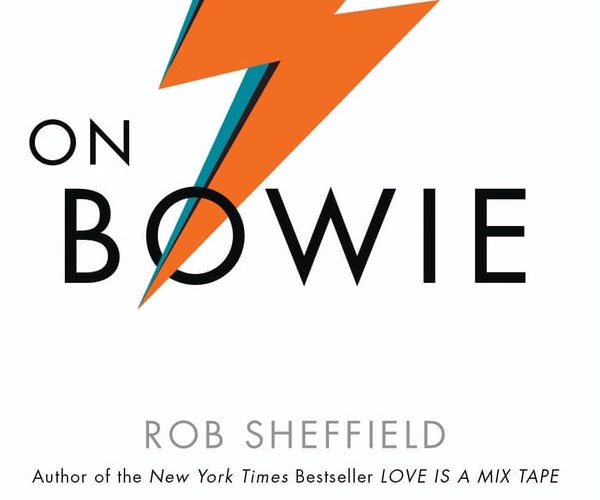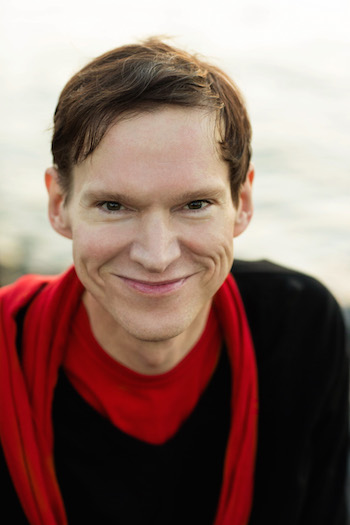Music Interview: Rob Sheffield on David Bowie
“It might sound a little kooky comparing David Bowie to poet William Butler Yeats, but they had similar pitfalls as artists.”

By Blake Maddux
Rob Sheffield is currently in his nineteenth year as a writer for Rolling Stone. He is also the author of the best-sellers Love Is a Mix Tape: Love and Loss, One Song at a Time and Talking to Girls About Duran Duran: One Young Man’s Quest for True Love and a Cooler Haircut as well as Turn Around Bright Eyes: A Karaoke Journey of Starting Over, Falling in Love, and Finding Your Voice.
In June, Dey Street Books published his latest book On Bowie (208 pages, $19.95). In October, the same publisher will release his currently in-the-works project Dreaming the Beatles: The Love Story of One Band and the Whole World.
The insatiable David Bowie (Arts Fuse remembrance) enthusiast and Boston native recently spoke to The Arts Fuse by phone from his home in Brooklyn.

“On Bowie” author Rob Sheffield: Photo: Marisa Bettencourt.
Arts Fuse: Where in Boston are you from?
Rob Sheffield: I grew up in Forrest Hills in Jamaica Plain for my early, early years and then we moved to Milton when I was before kindergarten age. My grandparents were both from Ireland. They came over in 1924 and they lived in Forrest Hills for the rest of their lives. So that was always my main Boston connection.
It was funny growing up in Boston as a Bowie fan, ‘cause it was such a Bowie town and such a music town. It has to be one of the best places in the country to grow up as a music fan. It really molded me in terms of my music tastes just ‘cause it’s a place full of so many different types of music. The ‘80s, when I was growing up, was such a fantastic time for Boston radio, so that was a huge influence on me.
AF: You just started answering my next question, which is do you have any specific Boston-related memories of David Bowie and did you ever see him live here?
Sheffield: Lots and lots of Bowie Boston memories, but I never saw him. It’s funny, he played at Sullivan Stadium [now Foxboro Stadium] in the summer of ’83. I didn’t have tickets to the show, so I was at my grandmother’s house in Forrest Hills listening on the radio to WBCN, which was the rock station then. And they were playing all the Bowie songs that existed from A to Z. Meanwhile, a couple of DJs from the station were reporting live periodically from the show, which was really stoking my jealousy. After the show, they come back to the studio—it was Oedipus and Albert O and Bradley Jay—with a cigarette butt that they’d stolen from the ashtray in Bowie’s limo. And they announced, “We’re going to light this up and smoke it on the air.”
A couple months ago, one of those guys put it up on YouTube. I was able to go back and listen to the broadcast, and it was bizarre how vividly I remembered it word-for-word, all the details of it. What is it with the brain of a teenage Bowie freak that something like this imprinted itself on my memory so deeply that hearing it once in 1983 I could recall it almost verbatim 33 years later? God help us all!
AF: In the introduction to On Bowie, you write that Bowie’s output from 1976 to 1980 constituted “the best five-album run of anyone in the seventies (or since)….”
Sheffield: You know, I will stand by that!
AF: Oh I’m not challenging it, but he did have a pretty good four-album streak from 1970 to 1973. Which release do you think prevented that one from equaling the later one: Space Oddity in 1969 or Diamond Dogs in 1974?
Sheffield: Gosh, but you know, I love Space Oddity and I love Diamond Dogs, just not as much. I think it’s just that the five-album pentalogy of the late ’70s is not just a peak for Bowie. It’s a peak for bands that he stumbled into, all these creative connections he made with people, like Brian Eno and Robert Fripp and Tony Visconti. It’s just a case of everything going for him in a way that he was able to capitalize on and really create this massive creative opportunity.
It’s really astonishing that during the time he made those five albums, he also made the two albums that brought Iggy Pop back—The Idiot and Lust for Life—and that he was also touring and made that amazing Stage live album, which is divisive. A lot of people don’t like that album, I happen to love it. It’s not even like these records sound like each other. They each have their own distinct personality.
AF: Would you say that he also had some highly unsatisfying stretches as well?
Sheffield: He had a long period of time where he was really trying and his heart was in the right place and he just wasn’t quite getting it right. Especially in the early ‘90s, with albums like Black Tie White Noise, where he was really trying, and he had a lot of good ideas, a lot of good collaborators, but he just didn’t have the musical strength at the time to make the album what he clearly wanted it to be.
AF: How long would you say that his most disappointing period lasted?
Sheffield: I would say from, say, ’84 to ’96 was a pretty depressing 12-year run for him in terms of his music. I don’t think he recorded more than a handful of good songs from that time.
AF: Which artist in popular music today do you think compares most closely to Bowie?
Sheffield: I saw Beyoncé a few weeks ago when she played at Citi Field. It was this awesome stadium spectacle kind of show. It made me think of Bowie a lot of times during the show. She’s somebody who, like Bowie, has been through a lot of different artistic changes and tried out a lot of different things that have inspired her, yet always comes out sounding like herself. I think that there’s a lot of Bowie in Beyoncé. She just like a prime example of the kind of pop star who has kept his legacy alive.
AF: Can you think of someone, either historically or presently, who was the David Bowie of an artistic medium other than music?
Sheffield: It’s funny how [William Butler] Yeats is someone who has a lot of interesting similarities with him. Hardly anybody in recent centuries has had a career like Yeats, where he’s great in the 1880s and he’s great in the 1930s. It’s just rare for anybody to maintain a level of inspiration like that. It might sound a little kooky comparing Bowie to Yeats, but they had similar pitfalls as artists. They were tempted by similar things. They had similar aspirations in a lot of ways, and similar blind spots in a lot of ways. They loved to make absolute ridiculous spectacles of themselves in similar ways, which had results that were often comic if nothing else.
But just that commitment to doing something new and to stay good at it that long. One of the many amazing things about Yeats is he’s the only guy to win the Nobel Prize for literature, but then went on to do his best work after that. Some of the greatest poems he wrote, he wrote in the last week of his life when he was on his death bed. I thought of the late Yeats an awful lot whiIe listening to Blackstar [Arts Fuse review] in terms of somebody who is coming to the end of a long and productive life and is not satisfied, wants to keep trying something new and keep innovating and to go out while still a pretty productive artist. I think that’s every artist’s fantasy, and Bowie — like Yeats — certainly lived that out.
Blake Maddux is a freelance journalist who also contributes to The Somerville Times, DigBoston, Lynn Happens, and various Wicked Local publications on the North Shore. In 2013, he received an MLA from Harvard Extension School, which awarded him the Dean’s Prize for Outstanding Thesis in Journalism. A native Ohioan, he moved to Boston in 2002 and currently lives with his wife in Salem, Massachusetts.
